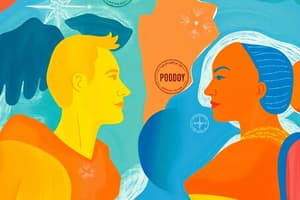Podcast
Questions and Answers
What is the primary role of agents in tourism development?
What is the primary role of agents in tourism development?
- To develop tourism infrastructure
- To provide guided tours to tourists
- To act as intermediaries between tourists, tourism operators, and local communities (correct)
- To create tourism policies and regulations
Which type of agent is responsible for planning and executing tourist trips?
Which type of agent is responsible for planning and executing tourist trips?
- Tour Guide
- Local Authority
- Travel Agent
- Tour Operator (correct)
What is the primary role of tour guides?
What is the primary role of tour guides?
- To provide guided tours and interpretive services to tourists (correct)
- To market and promote tourism destinations
- To assist clients in planning and booking travel arrangements
- To develop and implement tourism policies
Which type of agent is responsible for developing and implementing tourism policies and regulations?
Which type of agent is responsible for developing and implementing tourism policies and regulations?
What is the primary role of community-based tourism initiatives?
What is the primary role of community-based tourism initiatives?
What is a key responsibility of agents in tourism development?
What is a key responsibility of agents in tourism development?
What is a key benefit of agents in tourism development?
What is a key benefit of agents in tourism development?
What is a key role of agents in tourism development in terms of product development?
What is a key role of agents in tourism development in terms of product development?
Flashcards are hidden until you start studying
Study Notes
Agents in Tourism Development
Definition and Roles
- Agents in tourism development refer to individuals, organizations, or entities that play a crucial role in promoting and facilitating tourism activities.
- They act as intermediaries between tourists, tourism operators, and local communities.
Types of Agents
- Tour Operators: Plan, organize, and execute tourist trips, often providing package deals that include transportation, accommodation, and activities.
- Travel Agents: Assist clients in planning and booking travel arrangements, including flights, hotels, and activities.
- Tour Guides: Provide guided tours and interpretive services to tourists, sharing knowledge about local culture, history, and attractions.
- Local Authorities: Governments, municipalities, and local tourism boards that develop and implement tourism policies, regulations, and infrastructure.
- Community-Based Tourism (CBT) Initiatives: Local communities that develop and manage tourism activities, such as homestays, ecotourism, and cultural experiences.
Roles and Responsibilities
- Marketing and Promotion: Agents promote tourism destinations, activities, and experiences to attract visitors.
- Product Development: Agents develop and package tourism products, such as tour packages, accommodations, and activities.
- Infrastructure Development: Agents invest in and develop tourism infrastructure, such as hotels, transportation, and attractions.
- Stakeholder Engagement: Agents collaborate with local communities, tourism operators, and authorities to ensure sustainable tourism development.
- Capacity Building: Agents provide training and capacity-building programs for local communities and tourism operators.
Benefits of Agents in Tourism Development
- Economic Benefits: Agents generate revenue and create employment opportunities for local communities.
- Cultural Exchange: Agents facilitate cultural exchange between tourists and local communities, promoting cross-cultural understanding and appreciation.
- Sustainable Tourism: Agents promote sustainable tourism practices, ensuring that tourism development is environmentally, socially, and economically responsible.
Challenges and Limitations
- Dependence on External Agents: Local communities may rely heavily on external agents, reducing their control over tourism development.
- Unsustainable Practices: Agents may prioritize profits over sustainable tourism practices, leading to environmental and social degradation.
- Power Imbalance: Agents may have more power and influence than local communities, leading to unequal distribution of benefits.
Agents in Tourism Development
Definition and Roles
- Agents in tourism development are individuals, organizations, or entities that facilitate tourism activities and act as intermediaries between tourists, tourism operators, and local communities.
Types of Agents
- Tour Operators: Plan, organize, and execute tourist trips, providing package deals including transportation, accommodation, and activities.
- Travel Agents: Assist clients in planning and booking travel arrangements, including flights, hotels, and activities.
- Tour Guides: Provide guided tours and interpretive services to tourists, sharing knowledge about local culture, history, and attractions.
- Local Authorities: Governments, municipalities, and local tourism boards develop and implement tourism policies, regulations, and infrastructure.
- Community-Based Tourism (CBT) Initiatives: Local communities develop and manage tourism activities, such as homestays, ecotourism, and cultural experiences.
Roles and Responsibilities
- Marketing and Promotion: Promote tourism destinations, activities, and experiences to attract visitors.
- Product Development: Develop and package tourism products, such as tour packages, accommodations, and activities.
- Infrastructure Development: Invest in and develop tourism infrastructure, such as hotels, transportation, and attractions.
- Stakeholder Engagement: Collaborate with local communities, tourism operators, and authorities to ensure sustainable tourism development.
- Capacity Building: Provide training and capacity-building programs for local communities and tourism operators.
Benefits of Agents in Tourism Development
- Economic Benefits: Generate revenue and create employment opportunities for local communities.
- Cultural Exchange: Facilitate cultural exchange between tourists and local communities, promoting cross-cultural understanding and appreciation.
- Sustainable Tourism: Promote sustainable tourism practices, ensuring that tourism development is environmentally, socially, and economically responsible.
Challenges and Limitations
- Dependence on External Agents: Local communities may rely heavily on external agents, reducing their control over tourism development.
- Unsustainable Practices: Agents may prioritize profits over sustainable tourism practices, leading to environmental and social degradation.
- Power Imbalance: Agents may have more power and influence than local communities, leading to unequal distribution of benefits.
Studying That Suits You
Use AI to generate personalized quizzes and flashcards to suit your learning preferences.



